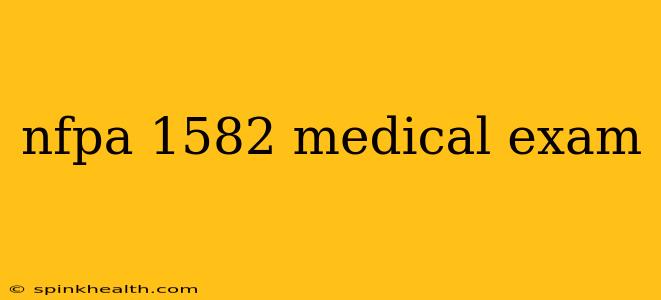Navigating the NFPA 1582 Medical Exam: A Firefighter's Journey to Fitness
The air crackles with anticipation. The scent of smoke, a familiar comfort, hangs heavy in the air. But today, the battle isn't against a raging inferno; it's against the clock, against the rigorous demands of the NFPA 1582 medical exam. For firefighters, this isn't just a checkup; it's a testament to their physical and mental fortitude, a gatekeeper to continued service. This comprehensive guide will walk you through the process, addressing common questions and concerns along the way.
This isn't just another physical; it's a specialized medical evaluation designed to assess the unique health risks faced by firefighters. The exam goes far beyond a standard check-up, delving into the potential long-term effects of exposure to hazardous materials, intense physical exertion, and the psychological stress inherent in the job. Passing this exam isn't simply about ticking boxes; it’s a critical step in ensuring the safety and well-being of both the individual firefighter and the entire team.
What does the NFPA 1582 medical exam involve?
The NFPA 1582 medical exam is a comprehensive evaluation that typically includes:
- A detailed medical history: This includes a thorough review of past medical conditions, surgeries, and medications. Honesty is paramount here, as any omitted information could impact your eligibility for service.
- Physical examination: This involves a complete physical assessment, checking your cardiovascular health, respiratory function, and musculoskeletal system. Expect thorough checks of your heart, lungs, and joints.
- Blood tests: These tests often include complete blood counts, metabolic panels, and lipid profiles to assess overall health and identify any potential underlying conditions.
- Cardiac assessments: This might include an electrocardiogram (ECG) and possibly a stress test to evaluate your heart's function under exertion.
- Pulmonary function tests: These tests measure your lung capacity and how efficiently your lungs work, crucial given the potential for respiratory issues in firefighters.
- Audiometric testing: This assesses your hearing, considering the potential for noise-induced hearing loss due to sirens, equipment, and emergency scenarios.
- Vision testing: Visual acuity and peripheral vision are vital for safe operation of equipment and effective navigation during emergencies.
- Psychological evaluations: This is a critical aspect, addressing the mental health challenges faced by firefighters, including PTSD and anxiety.
What are the common reasons for failing the NFPA 1582 medical exam?
Failing the NFPA 1582 isn't a reflection of personal weakness; it's often an indication of underlying health issues that need to be addressed. Common reasons for failing include:
- Cardiovascular issues: Conditions like high blood pressure, irregular heart rhythms, and coronary artery disease can be disqualifying.
- Respiratory problems: Asthma, chronic obstructive pulmonary disease (COPD), and other lung conditions often prevent firefighters from meeting the standards.
- Musculoskeletal injuries: Significant back problems, knee injuries, or other musculoskeletal issues can limit your ability to perform the job's physical demands.
- Hearing loss: Significant hearing impairment can be a safety hazard.
- Mental health concerns: Untreated mental health conditions, such as PTSD or depression, can impact job performance and overall safety.
How often do firefighters need to undergo the NFPA 1582 medical exam?
The frequency of NFPA 1582 exams varies depending on age, job responsibilities, and individual health factors. Generally, you can expect annual or bi-annual exams, with more frequent checks recommended as you age or if you've had any significant health changes.
What happens if a firefighter fails the NFPA 1582 medical exam?
Failing the exam doesn't automatically end a firefighter's career. It initiates a process of addressing the identified health concerns. This might involve:
- Further testing and evaluation: Additional medical assessments might be required to clarify the diagnosis and severity of any health issues.
- Treatment and rehabilitation: Addressing any health problems through appropriate medical care and rehabilitation is critical.
- Return-to-duty evaluations: Once health concerns are addressed, the firefighter may undergo another NFPA 1582 exam to determine fitness for duty.
The NFPA 1582 medical exam is more than just a hurdle; it’s a crucial step in ensuring the safety and longevity of firefighters' careers. By proactively addressing health concerns, firefighters can safeguard their well-being and continue to serve their communities bravely and effectively. It's a journey that demands dedication, self-awareness, and a commitment to maintaining optimal health – a testament to their commitment to both the job and themselves.

